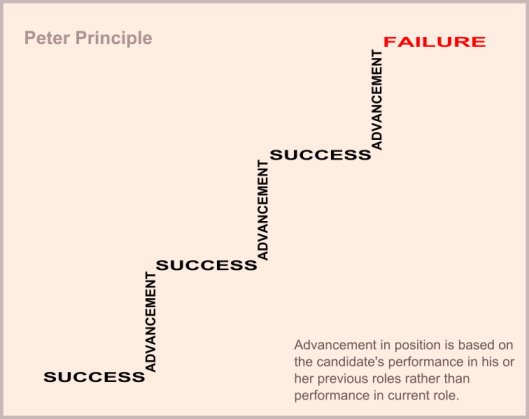How Misplaced Loyalty Undermines Profits
A FAMILY BUSINESS PROBLEM
Perhaps it’s time to reacquaint our family businesses with the definition of the Peter Principle. It is good to be reminded of how prevalent it is and why the best companies stay vigilant to manage against it.
The Peter Principle is a concept in management developed by Laurence J. Peter, which observes that people in a hierarchy tend to rise to their "level of incompetence". In other words, an employee is promoted based on their success in previous jobs until they reach a level at which they are no longer competent. This occurs because skills in one job do not necessarily translate to another. The concept was introduced very clearly in the 1969 book The Peter Principle by Peter and Raymond Hull.
It further states that a person who is competent at their job will earn promotions to more senior positions which require different skills. If the promoted person lacks the skills required for their new role, it follows that they will be incompetent at their new level, and so they will not be promoted again. But if they are competent at their new role, then they will be promoted again, and they will continue to be promoted until they eventually reach a level at which they are incompetent. Being incompetent, they do not qualify to be promoted again, and so remain stuck at that final level for the rest of their career. This outcome is inevitable, given enough time and assuming that there are enough positions in the hierarchy to promote competent employees to. The "Peter Principle" is therefore expressed as: "In a hierarchy every employee tends to rise to his level of incompetence. This leads to Peter's Corollary: "In time, every post tends to be occupied by an employee who is incompetent to carry out its duties.
According to Mr. Peter, companies predictably advance talent not based on how competencies align with the mission but rather based on success in a current position. This is often seen in companies where employees have demonstrated loyalty over time.
Loyalty is certainly not an undesirable trait; it simply isn’t enough to warrant one particular role over another. So how do we reward loyal and competent employees who are key to our long term success without positioning them to fail? Not an easy question but certainly one we ought to be asking more often.
THE NEED
Maybe promotions at some point become less important to employee needs. Simon Sinek, in his best seller Start with Why, illustrates that employees today want essentially three things. They want to feel as if they are part of something special, something that has purpose. They want to be able to grow in their careers, advancing competently and they want to enjoy a level of independence. As the leader of a family business, can you provide that without risking the Peter Principle? I think you can.
Behavioral science tells us that individuals are fully formed between 10–12 years of age. Some place it as early as 6 years of age. Whatever the real number, it makes the point that by the time they interview for a job their behavioral preferences are well established. Stay with me here as I make an important connection between this, our hiring practices, and the Peter Principle.
We know organizations with strong cultures outperform those without them. Employees prefer organizations with strong cultures over those without a focus on culture. Thus, it is in our best interests to develop a strong culture intentionally. For our purposes, think of culture as simply the aggregation of behaviors. By focusing on identifying the behaviors leadership believes are critical to the family businesses mission, you can not only address one of the important needs employees have identified by Simon Sinek, but you can position yourself to be more effective when recruiting new employees by evaluating their alignment to these behaviors.
If you ever expect to get the right people in the right seats on the bus (and you should) as Jim Collins preaches in Good To Great, you must pay attention to this part of operations. I know, it seems soft and squishy, but I assure you it is strategic and financial. A focus on culture can meet some, but not all, employee needs identified by Simon Sinek. Keith Ferrazzi published an article in Harvard Business Review that showcased the extreme importance of sound employee development programs. His article, 7 Ways to Improve Employee Development Programs, provides a surface level introduction to some things you should be considering. Check it out.
A STRATEGIC BUSINESS SOLUTION
We want to emphasize in this blog the importance of managing the risk of falling victim to the Peter Principle, assure you that alternatives exist to promoting the best of your employees to a position of guaranteed failure, and show you that a focus on designing a culture intentionally can help you avoid the pitfalls common to your competitors. We advocate a proprietary 8-step process, a system really, for defining the behaviors important to the mission, creating rituals around their practice until they become habits (The Habit Loop), and using what we’ve developed in our selection process when considering new hires.
Culture matters and it addresses many of the needs of your current employees. It demonstrably improves the odds that your new hires will be better positioned to fit in the culture we are creating. This saves money, builds institutional knowledge, and drives profits.

